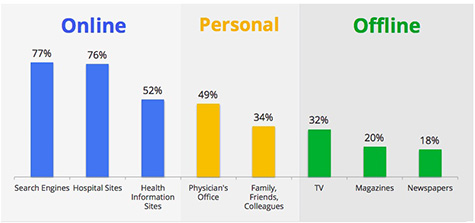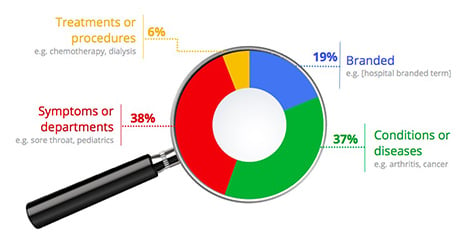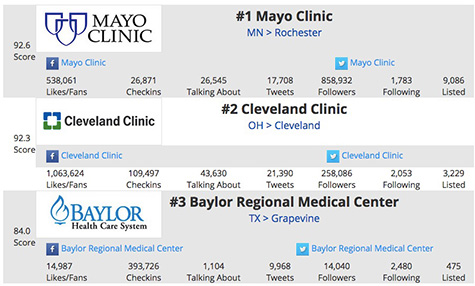3 Proven Digital Marketing Strategies for Hospital Patient Acquisition
As with every other marketing endeavor, hospitals’ efforts to acquire new patients have increasingly gone digital.
This shift has, for the most part, been hugely beneficial; digital channels offer many more targeting and measurement options than traditional approaches, making acquisition spend much more efficient (when done right).
Still, the speed and breadth of the transition has caused more than a few headaches for hospitals. The number of new digital marketing channels seems to be endlessly expanding, leading to confusion and questions (Should your organization be Periscoping? Meerkating? Zooming?)
Fear not. While there are many fresh digital outlets that haven’t yet bourne results, there is also now a core set of tried-and-true tactics that we know work for hospitals.
In particular, these three approaches have been proven to be effective in acquiring new patients.
1. Search Engine Optimization and Marketing, With an Emphasis on Services and Location
This can’t be emphasized enough: For most potential patients, the selection process starts with a search engine and a hospital’s website.
According to an in-depth research report from Google on how people research hospitals, some 77% of potential patients turn to a search engine and 76% look at an organization’s website — the most engagement, by far, with any marketing channels.
This means that search engine tactics — both optimization of your hospital site and investing in paid search ads — are vitally important.
The key, of course, is to devote your optimization time and ad spend on the right things. In particular, make sure that you’re paying attention to services and location.
Why services? Because the Google research found 45% of searchers are looking for procedure information (i.e., “chemotherapy”) or department information (i.e., “pediatrics”).
And why location? Because a survey conducted by Healthcare Success found consumers are more likely to choose a hospital based on convenient location (58%); than the amount of copay (45%) or even outcomes data (30%).
2. Relevant Digital Content About Health Conditions
When it comes to content marketing, hospitals are in an enviable position — yet many don’t realize it.
Often organizations in other fields struggle to come up with content ideas which they’re knowledgeable about and that will resonate with their target customers. Hospitals don’t have this problem. They have people eager for very specific content (information about medical conditions) and in-house experts who can provide it (doctors, nurses, administrators, etc.).
The Google study mentioned earlier found 37% of health searchers are trying to learn more about conditions/diseases, and an additional segment is researching symptoms. This means hospitals have a huge opportunity to engage potential patients by providing this sort of content.
The format of this content isn’t the most important thing — it can presented in a blog post, article, video, or even infographic — what’s essential is that’s truly well-informed and useful.
3. Social Media Engagement With a Purpose
A study last year by Nurse Journal evaluated over 800 hospitals to see which ones were doing the best job of connecting with their patients through social media (based on Twitter followers, Facebook fans, and levels of engagement).
The three hospitals that came out on top were the Mayo Clinic, Cleveland Clinic, and Baylor Regional Medical Center.
So what are these organizations doing right? In part, they are each highly-selective about what they share on social.
All three hospitals do not clog up their feeds with much news about internal matters — new hires, facility improvements, etc. — instead, they concentrate on providing useful health information to prospective patients (and consumers in general).
Sometimes this is in the form of broad advice (“Are your protein bars actually healthy? http://bit.ly/1PqfOms #healthyeating“) while other times it is highly specific (“@MayoClinic study finds organs at risk during RF ablation could be spared via intensity-modulated radiation therapy #HRS2015“). Always, though, the posts are meant to educate and inform.
In other words, these organizations are engaging with a purpose. That, ultimately, is the key to successful digital marketing for hospitals. Whether it be on search, a website, or social, it’s essential to focus on targeted tactics that first attract potential patients and then develop trust via expertise and credibility.
Implement a digital marketing strategy for your healthcare brand and increase patient acquisition. Contact MDG today at 561-338-7797 or visit www.mdgsolutions.com.
MDG, a full-service advertising agency with offices in Boca Raton and New York City, is one of Florida’s top healthcare marketing companies and branding firms, whose healthcare clients include Dental Care Alliance, MDVIP, Max Planck Florida Institute, HCA East Florida, Primary Pharmaceuticals, and MD Now. MDG’s core capabilities include branding, logo design, print advertising, digital marketing, mobile marketing, email marketing, media planning and buying, radio and TV advertising, outdoor, newspaper, video marketing, infographic development, website design and development, content marketing, social media marketing, and SEO. To learn more about the latest trends in healthcare marketing, contact MDG today at 561-338-7797.




